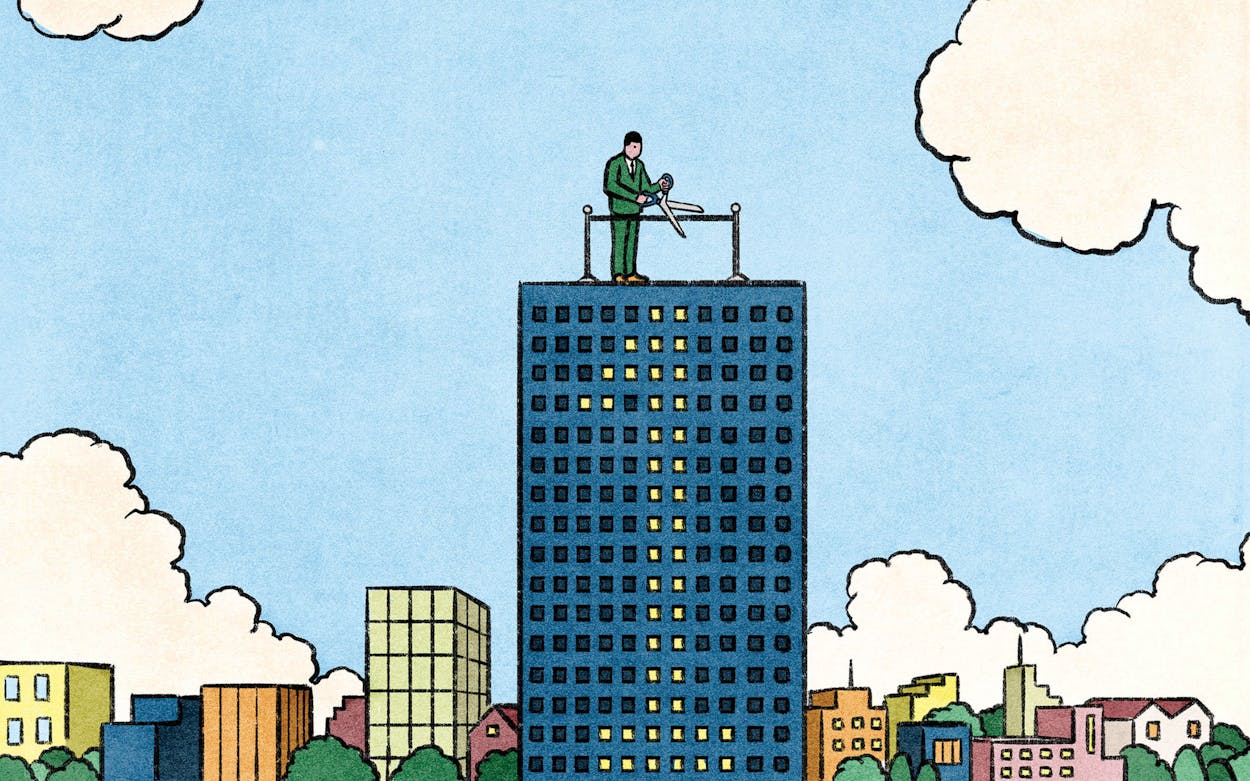On a recent Tuesday morning, as he presided over the ribbon cutting for a new golf resort in Frisco, Governor Greg Abbott sat on a dais behind a sign that read “CREATING JOBS.” Chief Executive magazine had just announced, for the twenty-third consecutive year, that its annual survey of U.S. chief executives had named Texas the number one state for business, and Abbott didn’t hold back in trumpeting the news. He compared his nine-year record as governor to the career of the University of Alabama’s famous head football coach. “I have won nine national championships for economic development, more national championships than Nick Saban has won,” he said. “With projects like this, I will have a ring for every single finger.”
He had plenty of reasons to gloat. A year earlier, Texas had leapfrogged California and New York to become the home state of the greatest number of Fortune 500 companies, at 53. Last year alone, Texas attracted more than one thousand corporate relocations and expansions, according to Business Facilities magazine, which ranked the state first in the nation for “business climate.”
That term is based on a number of metrics, though when people say Texas is business friendly, they’re usually referring to our permissive regulatory environment. With fewer rules, the thinking goes, companies are free to, say, launch giant rockets over a nature preserve without having to ask for permission from foot-dragging bureaucrats. “Just try to get a business license in California—it takes forever,” says Richard Fisher, the former president and CEO of the Federal Reserve Bank of Dallas. “Here, it’s very quick.”
Fisher acknowledges that Texas hasn’t generated as many innovative start-ups as California has. But he believes that rising interest rates are prompting venture capitalists to change their calculus. “Now that the cost of money has been restored, the negatives of California—hyperregulation, extreme taxation—are not offset any more,” he says. “That gives Texas an advantage.” CNBC recently noted that Texas, for the first time, tied California in the category “Access to Capital.”
Perhaps no issue gets more attention from the business community than Texas’s lack of personal and corporate income taxes. The truth is, neither may be all that big a deal. Property taxes can offset at least some income tax savings for individuals, and most businesses in Texas are assessed a “franchise tax” that can lead them to pay more than they would have in a typical state with an income tax. Still, according to the nonprofit Tax Foundation, Texas has the sixth-lowest overall tax burden in the country.
What might stop all this forward progress? Some worry that Texas’s restrictive positions on abortion, LGBTQ rights, and school curricula will deter companies from moving here. But so far there’s little evidence of that. “I think corporations feel they can take care of their employees and contribute to their communities,” says Dallas entrepreneur Mark Cuban. “That has more impact than what the state can or won’t do.” (Though CNBC notes that Texas has fallen out of the top five states for business for the first time, largely because of the state’s dead-last ranking in “life, health and inclusion.”) One likely stumbling block for CEOs is the state of our utilities. If catastrophic failures like the one we experienced in 2021 are repeated, Texas will begin to look a lot less attractive.
Abbott didn’t mention our creaky grid or divisive social policies that day in Frisco, but why would he have? The sun was shining, the new resort was going to create more than one thousand jobs, and the whole place had been built to complement another big business relocation: the PGA of America, which had just moved to Frisco from Palm Beach Gardens, Florida, thanks to $160 million in subsidies financed by Texas taxpayers.
“The Texas annual gross domestic product now exceeds $2.3 trillion,” Abbott noted. “We’ve gone from ranking twelfth in the world when I became governor to this year now ranking as the eighth-largest economy in the entire world.” He paused to bask in warm applause. The business community was delighted to be there.
This article originally appeared in the September 2023 issue of Texas Monthly with the headline “We’re Number One in Business! (Or Are We?)” Subscribe today.
- More About:
- Business
- Greg Abbott
- Elon Musk









